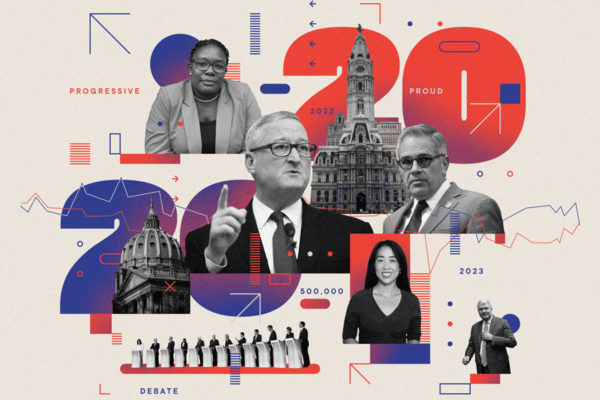“I got that a lot,” said Mock, a Democrat. “Quite frankly, it was, ‘Trump or Hillary?’ Nine times out of 10 it ended with one of us rolling our eyes and going ‘I can’t believe this is the best that we have.’”
Things haven’t changed much since then, and Mock doesn’t expect it to be any different in 2020. And there’s wide public perception that, if a person is in politics, surely they’re involved in all of politics — a belief that makes brings the national argument crashing into local matters.
“It’s not frustration with voters. It’s frustration with our national dialogue,” Mock said. “We’re so sucked into what seems to be a reality TV show.”
Mock’s experience is a window into the world in which state politicians live: not of national politics, but adjacent to it. Though their day-to-day responsibilities are in North Dakota, they’re oftentimes down-ballot from presidential choices, with their electoral hopes riding on a candidate’s ability to bring out voters. And the impeachment inquiry into President Donald Trump, now beginning in earnest in the U.S. House, holds the potential to either energize or deflate voters’ enthusiasm ahead of next year.
“What’s going on nationally … will affect me in the sense that anything on the top of the ticket (will) — who’s running for governor and some of the other offices,” said state Rep. Steve Vetter, a Republican from Grand Forks.
But for many of Grand Forks’ legislators, there’s a divide between the work they do in Bismarck and impeachment proceedings and scandal in Washington. State Rep. Mary Adams, a Grand Forks Democrat, had the luxury of running in 2018 — a midterm, non-presidential election — and her campaign heard mostly about local issues, she said.
“When I was campaigning … and when the Legislature was in session this year — basically (I heard) the North Dakota things (voters) were worried about. It was never national issues,” she said. “It was property taxes or the bills we were working on at the time.”
State and local politicians, not working alongside the president, are necessarily less engaged with Trump’s conduct and questions of impeachment, though there are still notable exceptions. State representatives around the country have made support for Trump key parts of their campaigns for higher office, wielding their support for the president against incumbents open to an impeachment inquiry. Rep. Justin Amash, a Michigan independent who earned a pile of headlines for his break with the president — as well as an exit from the GOP — might meet such a challenger at the ballot box next year.
And especially in left-leaning areas, local politicians often criticize the White House without fear of voters’ reprisals, offering a frank assessment of the president’s agenda. In Minneapolis, Mayor Jacob Frey responded to news of an Oct. 10 Trump rally by declaring that the president’s “message of hatred will never be welcome (here).”
In some notable cases, local politics even clash directly with Trump’s political future. In California, lawmakers passed a bill that would keep Donald Trump’s name off the 2020 ballot if he refused to release his tax returns, a measure that was blocked recently by a federal judge. California Secretary of State Alex Padilla, responding to the decision, argued in a widely reported statement that the law “is constitutional and provides invaluable transparency for voters as they decide who will hold the most powerful office in the United States.”
In recent days, Grand Forks legislators were pressed by the Herald how they might act if they were a legislator steering impeachment. Many said they wanted more investigation, or more information into the president’s actions, or a chance to talk with constituents. Democratic state Reps. Mock and Matt Eidson and GOP state Sen. Curt Kreun and state Rep. Mark Owens all offered varying responses that touched on that idea.
Mock, for example, expressed frustration with what he sees as a partisan pre-judgement that have made national Democrats skeptical of the president since early 2017. But he said he’s also concerned with Trump “inviting foreign players to intervene in our elections” and invited “fact-finding” on the matter with “no commitment to impeachment.”
Vetter remained skeptical that the president has committed any wrongdoing and noted that “Trump has been very good for North Dakota.” State Sen. Ray Holmberg, a Republican, declined to answer, pointing out that his role is to serve at the state level.
The Grand Forks legislator who warmed the most to impeachment was Adams, who previously shared a Facebook post comparing Trump to Adolf Hitler. She said she’s frustrated with “many, many things” the president has done, most recent among them when he called on China to investigate the business activities of former Vice President Joe Biden’s family, one of his leading political opponents.
“I would follow the Constitution,” she said. “It’s there for a reason … if the law is broken, (leaders) have to be held accountable.”
Grand Forks state Sens. JoNell Bakke, a Democrat, and Scott Meyer, a Republican, were unable to be reached for comment on Friday. Likewise for GOP state Reps. Mark Sanford and Emily O’Brien.
But aside from Adams, Grand Forks legislators have not been particularly outspoken on the president — perhaps unsurprising, given that Trump won the county with nearly 54 percent of the vote, trouncing Hillary Clinton’s roughly 36 percent and taking 24 of 27 precincts countywide.
And, in the end, the decision is a pain in the neck for someone else.
“(Impeachment) sucks the air out of political conversation, because the shiny object (is) in the room,” Holmberg said. “But as far as impacting us — because we’re not in session for another 12, 14, 16 months, we don’t get that inside-the-beltway conversation going on.”


